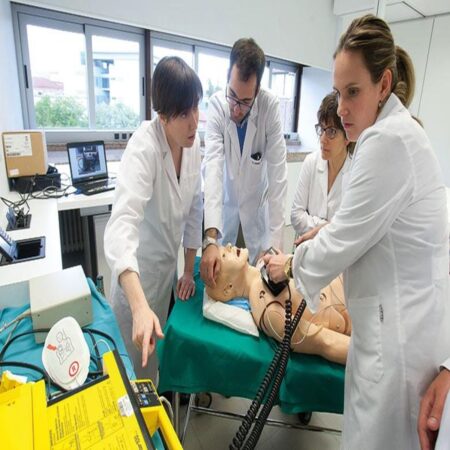
10 Best Universities in the World to Study Medicine in 2024
Welcome to the definitive guide to the top ten universities globally for pursuing a medical education in 2024. Delve into a world of excellence, where cutting-edge research, innovative teaching methods, and unparalleled clinical experiences converge to shape the future of medicine.
Join us as we explore the institutions renowned for their commitment to producing world-class medical professionals and groundbreaking discoveries that revolutionize healthcare.
Whether you aspire to specialize in surgery, research groundbreaking treatments, or make a difference in global health, these prestigious universities provide the platform for your aspirations to thrive.
SEE ALSO: Free Universities in Switzerland for International students
For many, becoming a doctor is a lifelong dream. Choosing the right university to embark on this prestigious journey is a crucial first step. To guide your exploration, here’s a curated list of the top 10 universities for medicine in 2024, encompassing diverse locations and academic strengths:
- Harvard University, USA
- University of Oxford, UK
- Stanford University, USA
- Johns Hopkins University, USA
- Karolinska Institutet, Sweden
- University of Cambridge, UK
- ETH Zurich
- National University of Singapore
- Peking University, China
- University of Toronto, Canada
Harvard University, founded in 1636, is one of the oldest and most prestigious universities in the United States. Initially established to educate Puritan ministers, it has since evolved into a leading global institution known for its academic excellence and contributions to research and innovation. Over its 380-year history, Harvard has played a pivotal role in shaping American higher education and has produced numerous influential alumni across various fields. Today, it remains committed to excellence, diversity, and social responsibility, continuing to lead in education, research, and public service. Renowned for its research prowess and world-class facilities, Harvard Medical School offers an unparalleled learning experience. But be prepared for intense competition and hefty costs.
The University of Oxford, founded in the late 11th century, is one of the oldest and most prestigious universities globally. It evolved from early schools into a collegiate system by the 13th century, attracting scholars from across Europe. Despite experiencing turbulence during the Reformation and English Civil War, Oxford flourished during the Enlightenment and Victorian eras, embracing academic reform and modernization. Throughout the 20th and 21st centuries, Oxford maintained its reputation for academic excellence and research leadership, remaining a top destination for students and scholars worldwide.
Steeped in history and academic excellence, Oxford’s medical program blends tradition with cutting-edge research. Expect rigorous academics and a competitive environment.
3. Stanford University, USA:
Stanford University, founded in 1885 by Leland and Jane Stanford in memory of their son, quickly emerged as a leading research institution with a focus on science, engineering, and agriculture. Despite setbacks like the 1906 earthquake, Stanford expanded its academic programs, attracted renowned scholars, and became closely linked with Silicon Valley, fostering innovation and entrepreneurship. Today, Stanford is globally recognized for its academic excellence and contributions to research and technology, maintaining its position as one of the world’s premier universities. Pioneering in technological advancements and interdisciplinary collaboration, Stanford’s School of Medicine fosters innovation and leadership in healthcare. Be ready for a highly selective admissions process.
4. Johns Hopkins University, USA:
Johns Hopkins University, founded in 1876 through a bequest from Johns Hopkins, pioneered a groundbreaking model of higher education by integrating research with teaching. It quickly rose to prominence under the leadership of Daniel Coit Gilman and became renowned for its emphasis on innovation and discovery across various disciplines. With its close association with Johns Hopkins Hospital and Medical School, the university made significant contributions to medical education and research. Throughout its history, Johns Hopkins has maintained its commitment to academic excellence and research innovation, making it one of the world’s leading research universities. A leader in medical research and patient care, Johns Hopkins offers a diverse range of programs focusing on clinical excellence and global health initiatives. Expect a focus on practical application alongside theoretical knowledge.
5. Karolinska Institutet, Sweden:
Karolinska Institutet, founded in 1810 in Stockholm, Sweden, initially focused on medical education and training, later expanding into research. It gained renown for awarding the Nobel Prize in Physiology or Medicine. Over the years, the institute has expanded its programs, embraced modernization, and become a global leader in biomedical research. Its contributions to understanding human health and disease have had a significant impact worldwide, and it continues to attract top talent, ensuring its position as a premier medical university. Dedicated to research excellence and personalized learning, Karolinska Institutet attracts students worldwide with its innovative curriculum and strong global partnerships. Prepare for a strong emphasis on research alongside clinical training.
6. University of Cambridge, UK:
The University of Cambridge, established in the 12th century, evolved into one of the world’s leading academic institutions. Through its collegiate system, it fostered a thriving scholarly community. Cambridge played pivotal roles during the Renaissance, the Scientific Revolution, and subsequent periods of intellectual and scientific advancement. Over centuries, it expanded, modernized its curriculum, and remained at the forefront of research and education. Cambridge’s global impact is profound, with its graduates and faculty making significant contributions across various fields. Today, it continues to attract top talent and uphold its tradition of academic excellence and innovation.
Combining tradition with cutting-edge research, Cambridge offers a rigorous program fostering independent learning and critical thinking. Expect a highly competitive admissions process.
7. ETH Zurich – Swiss Federal Institute of Technology, Switzerland:
ETH Zurich, founded in 1854, is a leading institution for science and technology education and research. Originally established to meet Switzerland’s need for skilled engineers and scientists, it quickly gained international recognition for its excellence. Throughout its history, ETH Zurich has expanded its academic programs, fostered research excellence, and cultivated a culture of innovation and entrepreneurship. Its contributions to science and technology, along with its collaborations worldwide, have made it a hub for global knowledge exchange and societal impact. Today, ETH Zurich continues to attract top talent and uphold its tradition of excellence in education, research, and innovation.
This institute excels in scientific research and technology integration within its medical program. Prepare for a strong focus on scientific principles and technological applications in healthcare.
8. National University of Singapore:
The National University of Singapore (NUS) was formed in 1980 through the merger of the University of Singapore and Nanyang University. Since then, it has grown into one of Asia’s leading universities, renowned for its academic excellence, research contributions, and global partnerships. NUS prioritizes research and innovation across various disciplines, fostering international collaborations and attracting top talent from around the world. Its commitment to excellence has earned it recognition as a premier institution of higher learning, positioning it as a key player in addressing global challenges and advancing knowledge for the benefit of society. This rapidly rising star in medical education offers a curriculum focused on global health challenges and population health, preparing future doctors for diverse needs. Expect a multicultural learning environment.
9. Peking University, China:
Peking University, founded in 1898 as the Imperial University of Peking, is one of China’s oldest and most prestigious universities. It has played a central role in China’s intellectual and cultural development, navigating through political upheavals and societal changes. Renowned for its academic excellence and research achievements, Peking University has contributed significantly to China’s advancement in various fields. Today, it continues to uphold its tradition of excellence while promoting international collaboration and fostering innovation for the betterment of society.
Boasting a long history and strong research focus, Peking University’s medical program integrates traditional Chinese medicine with Western medicine principles. Be prepared for a rigorous and competitive environment.
10. University of Toronto, Canada:
The University of Toronto, established in 1827 as King’s College and later secularized to become the University of Toronto in 1850, has evolved into one of Canada’s premier institutions of higher learning. With a rich history of research and innovation, it has made significant contributions to various fields, including medicine, technology, and the humanities. Known for its diverse and inclusive community, the university attracts students and scholars from around the world. Continuously adapting to the changing landscape of higher education, the University of Toronto remains committed to academic excellence, research, and service to society, maintaining its position as a leading global institution.
Recognized for its research strengths and diverse clinical experience opportunities, Toronto’s medical program offers a well-rounded education with a focus on social accountability in healthcare. Expect a strong emphasis on patient-centered care.
SEE ALSO: Study and Work Opportunities in Canada
While ranking is a good starting point, consider these factors for a well-informed decision:
Academic focus and strengths: Align your interests with the university’s research and program emphasis.
Location and culture: Consider your preferred learning environment and potential career aspirations.
Admission requirements and competitiveness: Assess your qualifications and research the typical applicant profile.
Cost and financial aid options: Factor in tuition fees, living expenses, and scholarship opportunities.
Remember, the “best” university is subjective and depends on your individual goals and preferences. Research thoroughly, connect with alumni and current students, and choose the institution that aligns with your vision for a rewarding medical career.
This list merely scratches the surface of the incredible medical schools around the world. With dedication and the right guidance, you can find the perfect fit to launch your journey towards becoming a world-class doctor!




